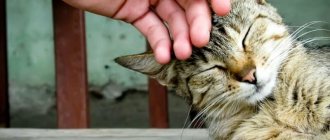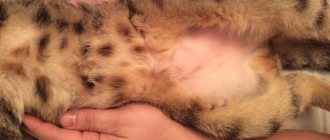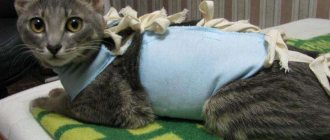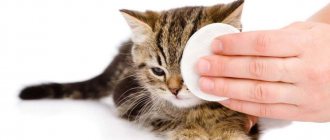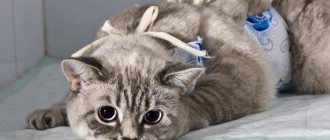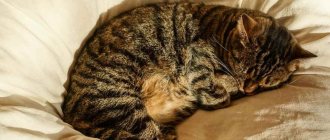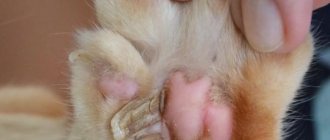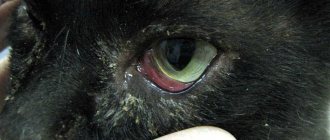7796Administration
1
Licking fur is a normal natural process for representatives of the cat family. After sleep, walks, and meals, cats take care of their fur, washing away dirt from it. But if the process of cleaning the fur occurs frequently, the cat intensively licks certain areas on the body - this may signal any malfunctions or disturbances in the body. For example, many owners are interested in the question: “Why does a cat constantly lick eggs and its genitals?” Let's consider the reasons for this behavior.
What you need to know about castration
Castration is a simple and quick operation that takes no more than 20-30 minutes. But as after any surgical intervention, in order for the postoperative recovery period to pass without complications, the cat needs careful, delicate care and care.
Important! Any operation is a strong stress for the animal’s body, which can affect the condition and behavior of the pet.
If the operation went well, after about 30-40 minutes you will be able to take your pet home. Take care of a carrier, a basket, at the bottom of which place a disposable sterile diaper, clean flannel, or any other waterproof fabric. It is better to transport your cat not in public transport, as this can cause additional stress, but in a taxi or personal car.
Why does a cat lick a wound?
There are many reasons. But the main one is the natural tendency of these animals to be clean. As soon as your pet comes to his senses after anesthesia, he will put himself in order. If there is blood in the area of the operated scrotum, he will try to remove it. Thus, the first reason for “licking” is the animal’s natural instinct aimed at maintaining a “neat” appearance.
It is worth noting that excessive bleeding after a normally performed castration is a very, very rare occurrence. As a rule, within an hour and a half after the operation, the release of bloody fluid (ichor) is allowed, but later it completely stops (under normal conditions).
Remember! Licking a postoperative wound due to the release of a significant amount of blood is not a good sign, and here you need to worry about the very tangible possibility of internal bleeding.
This often happens when castration is performed carelessly. The classic cause of such “troubles” is a poorly/unsuccessfully applied ligature (or the use of initially poor suture material). However, in the case of more or less serious bleeding, problems with licking wounds rarely arise - the animals weaken much earlier and die from internal blood loss. Much less often, a cat licks a bleeding scrotum due to problems with blood clotting that were not identified in a timely manner at the stage of preparation for surgery.
If you notice that the operated pet is constantly and intently licking blood from the genital area, immediately take it to the clinic where the operation was performed.
If this is not possible, go to any other veterinary institution/call private specialists (be sure to tell them about what is happening). Delay may cost the cat his life.
You need to act quickly when all visible mucous membranes of your pet noticeably turn pale. It is likely that the cat needs urgent abdominal surgery. In such cases, transfusion of blood substitute fluids is highly recommended (to prevent arterial collapse).
Is it possible to lick a wound?
Despite the fact that the saliva of our little brothers contains enzymes and substances that accelerate healing and tissue regeneration, it can also contain pathogenic microorganisms that will lead to the development of acute inflammation, suppuration, and infection. If a cat licks a wound, the natural healing process is disrupted.
In addition, the rough tongue of felines, especially with frequent intensive licking, can lead to sutures coming apart and bleeding. If a cat licks itself, treatment with antiseptics and disinfectants will not give the desired result and will increase the rehabilitation period. Therefore, you need to constantly monitor the cat and monitor the condition of the wounds daily.
Inspect the scrotum for signs such as redness, tenderness, and swelling. If blood oozes from the wound, severe bleeding has developed, the stitches have come apart, or greenish-yellow exudate is released, immediately contact your veterinarian and take your pet to the clinic. Make sure that no dirt gets into the wounds. If, for example, the postoperative area is contaminated with feces, clean the wound with warm water and a weakly concentrated solution of betadine. Dry the seam and lubricate it with antibacterial ointment.
Important! After surgery, consult with your surgeon regarding proper care.
If, in addition to licking, the cat shows restlessness, rushes around the apartment, tries to hide in dark secluded places, constantly meows pitifully and this behavior lasts more than two days, consult a veterinarian. It’s better to play it safe once again than to correct serious consequences later.
Cat, kitten licks eggs after castration
If a kitten or cat licks its eggs after castration, but the animal’s condition is stable, there are no uncharacteristic symptoms - this is normal. After surgery, some time is required for tissue restoration, so the cat will lick the postoperative suture. Animal saliva has antibacterial properties and contains the enzyme lysozyme, so regeneration processes occur faster.
After castration, a kitten or an adult pet may experience stress, so for the first time after the operation they lick their testicles.
If castration is carried out in adulthood, the period of adaptation and hormonal changes in the body occurs more slowly and will take longer than in a kitten.
In case of deterioration of the condition, excessive discharge, suppuration of the suture, wound, fever, swelling of the groin area, immediately contact your veterinarian!
Postoperative area care
To prevent the cat from licking the wounds and gnawing on the stitches, after the cat has recovered from anesthesia, put on a protective cone (Elizabethan collar) for the pet. A similar accessory can be purchased at a veterinary clinic, pet stores, or veterinary pharmacy. If desired, you can make the collar yourself using cardboard, flexible durable plastic or thick fabric. Give preference to durable material, since the cat will try to pull it off in every possible way.
To ensure that the collar does not cause discomfort to the cat or hinder movement, it must be suitable for the pet in size.
You can also protect the postoperative area from licking by using baby diapers (for newborn babies). For convenience, cut a hole for the tail.
A cat constantly licks its tail
If a cat often licks under its tail, this should alert the owner. Various reasons force males and females to lick this place.
If a cat often licks its tail, then this is:
- inflammation of the preputial sac;
- inflammation, injury or cancer of the foreskin;
- urethral diseases (stones, trauma, neoplasm);
- bladder diseases (infections, tumors, stones);
If a cat constantly licks itself, then this should alert the owner
- prostate diseases (prostatitis, tumor, abscess);
- urinary incontinence;
- dysfunction of the sphincter;
- bleeding (coagulopathy) and thrombocytopenia due to rat poison poisoning.
For your information! Cats have a fatty lubricant in their skin that contains cholesterol, which in the sun is converted into vitamin D. By licking, the cat distributes this substance over the entire surface of the body.
Females often lick themselves before and after childbirth, and this is not a pathology. But there are a number of situations where excessive licking is a symptom of illness.
If a cat constantly licks its tail, then this is:
- urinary tract infections;
- inflammation of the uterus and vaginitis;
- tumors of the genitourinary system;
- injury or foreign body in the urinary tract or vagina;
- blood clotting (coagulation) and thrombocytopenia in case of poisoning with rat poison;
- urinary incontinence, sphincter dysfunction;
- retained placenta or death of the kitten during childbirth.
Important! If a cat constantly licks the area near the tail, then the owner needs to pay attention to the discharge from the pet’s genitals. These symptoms will help the veterinarian make the correct diagnosis and treat your pet.
If your cat is constantly licking his tail, you need to take a closer look at other symptoms.
Allergic reactions to foods
The most common cause of itching and skin irritation in cats is food allergies. A cat can become ill from both natural food (for example, meat) and special industrial ones. Popular cheap foods (Kitecat, Whiskas, etc.) cause allergies in many people. It is advisable to choose premium hypoallergenic ones, which are sold only in pet stores.
For your information! Most often, allergies are caused by food proteins, which are found in large quantities in chicken meat, cow's milk and a number of other products.
If a veterinarian has discovered a food allergy in a cat, you need to exclude the dangerous product from the diet and prescribe the correct diet for your pet.
A cat food allergy often manifests itself as inflammation on the skin.
Presence of parasites in the body
External and internal parasites often cause cats to scratch and lick themselves. Fleas, ticks, and lice eaters are especially dangerous for furry pets. They bite the cat and drink its blood, and this leads to the development of allergies and decreased immunity. Ear mites often cause otitis media, a serious disease that can lead to serious complications.
If a cat has parasites in its fur, it will lick them frequently and feverishly. Small blood-sucking insects greatly irritate your pet's delicate skin. Parasites can be easily removed with flea treatment, but you should consult your veterinarian and check your cat for other diseases.
Damage to the skin on the tail
Any owner knows why cats lick themselves. If your cat's tail has wounds or any other damage, it can cause itching and irritation. Having received an injury, the cat begins to lick the sore spot in order to heal it. This way the animals lick any sores. To prevent your cat from doing this, you can put an Elizabethan collar on it.
Unpleasant habit after castration
A situation often arises when a cat licks itself after castration. Every veterinarian knows what to do in this case. He must examine the pet and check for allergies, infections and inflammatory processes.
What to do if a cat licks a wound
If, nevertheless, the cat licked the wound, bleeding developed, or inflammatory swelling appeared, consult a veterinarian regarding further actions. The veterinarian will prescribe symptomatic medications for general and local treatment.
As a rule, complete healing of wounds after castration occurs on the 9-13th day . But if, nevertheless, the cat licked the wound, bleeding developed, or inflammatory swelling appeared, consult a veterinarian regarding further actions. The veterinarian will prescribe symptomatic medications for general and local treatment. Ranosan, Safroderm, Sanatol, Septogel, Levomikol, Iruksolone, and other wound-healing drugs are used. Before applying medications, the wound surface is treated with any antiseptic. In case of severe swelling, anti-inflammatory ointments, gels, and liniments with an antibacterial effect are used. If there is a suspicion of severe infection, the pet is prescribed a course of antibiotic therapy.
If you notice that your pet’s condition is worsening, or symptoms that are uncharacteristic of a healthy animal are noticeable, take the cat to a veterinary clinic or call a veterinarian at home.
Symptoms and therapy
Let's look at the main symptoms of orchitis in a cat. There are quite a lot of them; an attentive owner will probably be able to notice at least some of these clinical signs:
- Soreness and swelling of the testicles. The most specific symptom of inflammation is that the testes are noticeably warm.
- Soreness and swelling of the testicular appendages.
- In many cases, the scrotum is involved in the inflammatory process: its skin also turns red and becomes painful.
- The cat constantly licks his scrotum.
- The animal walks with extreme reluctance, fearing to once again disturb the inflamed testicles.
- Refusal to eat, complete loss of appetite.
- Intermittent fever.
- Infertility (this symptom is especially important and indicative for breeders).
- The cat becomes lethargic, apathetic, and tries to hide in a remote and dark place.
- Sometimes the pain is so severe that the animal bites its testicles, causing scratches and wounds to appear on them.
What is the treatment for orchitis in cats? Since in most cases the nature of orchitis is infectious, broad-spectrum antibiotics and other antimicrobial agents are prescribed. Non-steroidal anti-inflammatory drugs can be used to relieve inflammation. Novocaine blockades have a good anti-inflammatory effect.
With the traumatic nature of orchitis, applying cold to the affected tissues is indicated. On the third or fourth day, you can start using heat, including paraffin applications. If the animal’s condition raises concerns for its life, they resort to therapeutic castration (even if the cat has breeding value).
Symptoms of the presence of parasites
Animals show increased attention to their own hygiene in the presence of parasites - fleas or ticks. At the same time, the cat is constantly itching, shaking itself off and licking itself. You can suspect parasites by carefully examining the animal's fur.
If no fleas are found, it is recommended to inspect the coat again, paying attention to the areas behind the ears and on the neck. A possible cause of discomfort may be nits, which can be difficult to detect with a quick examination. Excessive peeling of the skin in the absence of visible parasites may indicate a mite.
As a rule, with such diseases, the animal constantly tries to gnaw something out of the fur, simultaneously licking different parts of the body. Treatment is carried out using special anti-parasitic drops.
You might be interested in: Why does a cat have a constantly wet chin?
